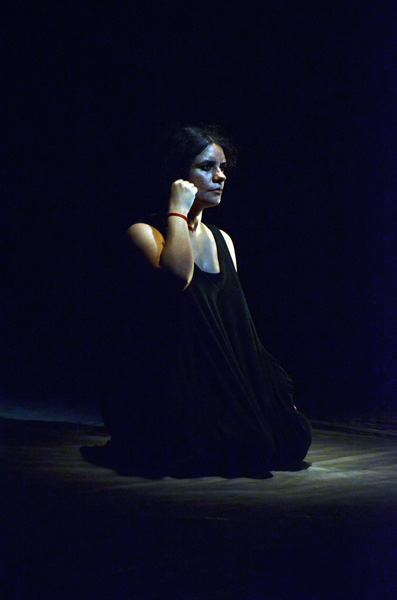Jyoti Dogra



Grant Period: Over one year and six months
For research towards, production and dissemination across six tier B cities of a performance piece, tentatively titled Notes on Chai. The performance will explore the idea of the quotidian in everyday life, by combining realistic character-based pieces with abstract sounds.
Jyoti Dogra is a Mumbai-based dancer, actor and performance artist, who was awarded an Extending Arts Practice (EAP) grant in 2008-09 for The Doorway, a Grotowski-inspired performance piece. Jyoti’s final narrative report for ‘The Doorway’ outlines her artistic interests, which lead to her current project, tentatively titled ‘Notes on Chai.’
The project is planned as a performance piece which will use abstract sound and language to explore the idea of the quotidian. This interest in the mundane emerged out of Jyoti’s Vipassana experience, where she realised that the absence of language left her with a diminished sense of self and identity. Reflecting on this, Jyoti says, “Inconsequential everyday exchanges are filled with repeated attempts at creating meaning for ourselves. These acts themselves seem to very delicately allow for some deeper existential needs to be addressed. Although policed by propriety and moral codes, they continue to bear traces of our desires, fears and biases.”
To capture these quotidian elements of daily living, Jyoti has been developing a set of conversations around chai and responses to the question, ‘how are you?’ The characters in her performance piece are drawn from across class and age groups, and she hopes to capture everyday estrangement by juxtaposing realistic pieces with abstract sounds. In particular, she is working with techniques like the Tibetan throat singing and Western overtones, where sound appears to emanate from the entire body, and can be controlled by amplifying or reducing wavelengths, by moving it through the body’s sound tracts. She has been training with the monks at the Gyuoto Monastery in Dharamsala and with overtone singers Mario and Dana Stratil based in Auroville and Zurich, respectively, which she will continue to do so over the next year. She is also working on Extended Vocal Techniques (EVT), which involve non-traditional methods of vocal production, altering the natural timbre of the voice.
‘Notes on Chai’ responds to Jyoti’s concerns about contemporary performance in India, which in her view, is often heavily influenced by western aesthetics in terms of imagery, scenic design, content and the use of the body. She feels work that is grounded in an artist’s own life, location, and circumstances is truly contemporary and experimental, since the material for investigation in such work stems from immediate concerns. She therefore feels that such work can address issues both of form and content in ways that require us to engage with it at a more personal, immediate, and individual level.
Jyoti’s concerns extend to the question of audiences too. Contrary to the prevalent notion that audiences for experimental work are based in metropolitan cities, Jyoti intends to perform her piece across at least six smaller cities in North and West India that have undergone rapid urbanisation in the last decade or two. She believes that the non-dramatic, seemingly repetitive structure of the performance piece combined with familiar stories and characters, will enable the spectators in these cities to engage with the piece more introspectively. Jyoti approaches the project as a series of in-process performances every other month, which will further evolve based on the audiences’ response. In tandem, she plans on holding discussions in art schools or arts space, to initiate a dialogue on what constitutes ‘contemporary performance’ in India. This is a significant project to support under EAP, not least because of Jyoti’s experimentation with form, but also because of her investment in arriving at an understanding of ‘contemporary performance’ and the audiences for these, which should make a crucial contribution to the critical discourse in the field.
